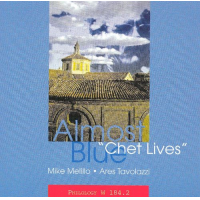Home » Jazz Articles » Album Review » Bob Brookmeyer New Art Orchestra: New Works (Celebration)
Bob Brookmeyer New Art Orchestra: New Works (Celebration)
Bob Brookmeyer, at age 70, is enjoying renewed celebrity as an artist. But, unlike so many others who ascend to legendary status late in life, it's not because he's out-survived his peers. Still known primarily for his distinctive and lyrical valve trombone playing (he's also an especially deft touch on piano), he's now evolved into a magnificent composer. Indeed, much of the music he records these days - notably issued by the more artistically inclined European labels - captures his compositions and rather too little of his gorgeous playing.
The captivating New Work (Celebration), though, is remarkable evidence of the intricate musical language Bob Brookmeyer has crafted as a composer. In the realm of his own inner logic - informed by Sauter and Stravinsky as much as George Russell and even Boulez - Brookmeyer has conceived something that is as warm and passionate as it is cerebral and sometimes startling.
The disc is built around the four-part "Celebration" suite, originally written for the late Gerry Mulligan. A seamless collection of sounds, "Celebration" is a broad travelogue that wends in 30 minutes through many of fields Mulligan and Brookmeyer once explored together. Excellently substituting for Mulligan is Scott Robinson on baritone sax (and every other kind of reed instrument elsewhere) and he is indeed the star soloist.
But the canny 18-piece New Art Orchestra, formed in Germany by Brookmeyer, is the star voice - given to beautifully poetic pronouncements phrased by Brookmeyer's strategic writing. Sounds are declarative without being imposing. Themes develop slowly over long passages, effectively dismantling ideas that improvisational music must conform to three chords or 12 bars.
The suite reaches its peak in the exciting fourth movement ("Celebration Two And"), a true celebration of swing and synapse based on, of all things, the Charleston dance. Here, Robinson's baritone and Brookmeyer's trombone (!) happily shuffle through a whole history of jazz statements — from swing and Dixieland to orchestral jazz and avant-garde. Like a crafty puppetmaster, Brookmeyer unerringly guides the orchestra to suggest it all with an effortlessness that is astounding and a consistency which strikes only after the first few listens (clearly, there's a teacher at work here).
It is probably not without significance that Brookmeyer, the player, is featured on the disc's best tracks, the gorgeous "Idyll," the waltz-like "Cameo" and the comes-out-swinging "Boom Boom." Both "Idyll" (originally written for Lee Konitz) and "Cameo" are brimming with beauty in the way that recalls some of the lovely pieces Brookmeyer wrote for 1993's Paris Suite quartet. Both seem to be melodic anti-melodies too. They're not easy to hum along to. But Brookmeyer's clean, simple conception lulls with a magisterial elan that is unquestionably melodic. In fact, Brookmeyer's playing here seems so well considered, one might guess it was wholly written out ahead of time.
"Boom Boom," part of Brookmeyer's "Danish Suite," concludes the disc with what seems an homage to those intellectual, gifted writers (Sauter, Hefti, Evans, maybe even Ogerman etc) who wrote for dance bands with a wit that said something different was at work. It's a happy piece that features some glossy playing by trumpeter Ralf Hesse.
Of note too is the unusual (and rather more Brookmeyer-like) "Duets," seemingly named for the alternatives Brookmeyer proposes between orchestra and player and rhythm and melody. It is, perhaps, the disc's most experimental track. Clocking in at over 12 minutes, it's also the longest. There's a Monk-ish quality to Brookmeyer's exercise here, guided especially by John Hollenbeck on drums. Here, Brookmeyer explores the nuances and improvisational possibilities of whole tones, similar to the way he did on his superb 1991 ACT disc, Electricity, showing how he can set tradition a little ahead of its time.
This 1997 recording evidences much that is grand and promising in the second career of Bob Brookmeyer. One suspects that his arrangement with the Dutch Challenge label will proffer a great variety of interesting recordings in the future too (a trombone-bass duo with Mads Vinding is next). But we can only hope for more of the poetic explorations Brookmeyer achieves here with the New Art Orchestra too.
Tracks:Celebration Jig; Celebration Slow Dance; Celebration Remembering; Celebration Two And; Idyll; Duets; Cameo; Boom Boom.
Players:Scott Robinson: baritone sax; Marko Lackner, Stefan Pfeifer: alto sax; Paul Heller, Nils van Haften: tenor sax; Marcus Bartelt: baritone sax; Thorsten Benkenstein, Torsten Mass, Sebastian Strempel, Ralf Hesse, Jorg Engels: trumpet; Bob Brookmeyer: valve trombone, composer; Ludwig Nuss, Ansgar Striepens, Christian Jakso: trombone; Edward Partyka: bass trombone; Kris Goessens: piano; Jurgen Grimm: keyboard; Ingmar Heller: bass; John Hellenbeck: drums; Christopher Dell: percussion.
Personnel
Album information
Title: New Works (Celebration) | Year Released: 2000 | Record Label: Challenge Records
Tags
PREVIOUS / NEXT
Support All About Jazz
 All About Jazz has been a pillar of jazz since 1995, championing it as an art form and, more importantly, supporting the musicians who make it. Our enduring commitment has made "AAJ" one of the most culturally important websites of its kind, read by hundreds of thousands of fans, musicians and industry figures every month.
All About Jazz has been a pillar of jazz since 1995, championing it as an art form and, more importantly, supporting the musicians who make it. Our enduring commitment has made "AAJ" one of the most culturally important websites of its kind, read by hundreds of thousands of fans, musicians and industry figures every month.


















